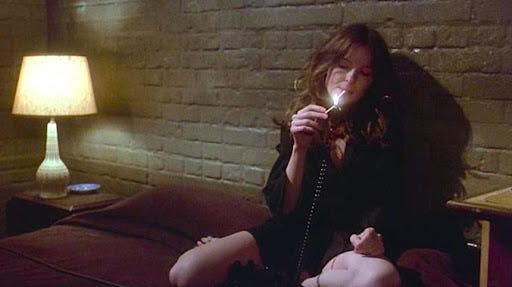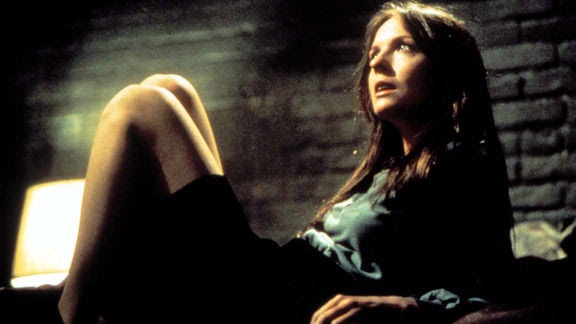plug: Klute (1971) + Looking for Mr. Goodbar (1977)
A 70's "dark character study" double-feature
This week’s plug is a double-feature of two excellent female-led “dark character studies” from the ‘70s. I watched both of these films last month and my main takeaway was they should definitely be counted more often among all those ‘70s character-study movies like Taxi Driver, The French Connection, Network, One Flew Over the Cuckoo’s Nest, The King of Comedy — you know, all the ones that have been in “the discourse” in a sorta bland, surface-level, shitty Internet way since Joker came out or whatever.
Klute is the first entry in director Alan Pakula’s unofficial “paranoia” trilogy (followed by The Parallax View and All the President’s Men) and by my estimation the best of the three, largely thanks to Jane Fonda’s fucking legendary performance. Fonda plays Bree Daniels, a New York sex worker who finds herself at the center of a strange, corporate-conspiracy-related disappearance of a former client. The titular John Klute (Donald Sutherland) is a small-town detective tasked with solving the disappearance of his friend, and the formidable Bree is his only lead.
The fact that this movie is called Klute is a memorable, idiosyncratic move because Bree is undoubtedly the whole show here (explicitly so, in fact. Jane Fonda gets top billing, and if she hadn’t it would’ve been weirder than calling the film Klute). John Klute is the catalyst, a sort of friendly cipher that ignites the whole riveting journey with Bree. The film is tightly framed inside a bomb-ass ‘70s thriller plot, but Bree’s emotional journey and Fonda’s performance, so intense and layered that it’s almost paralyzing to take in, totally eclipses the film’s “thrillerness” in a really emotionally satisfying way.
The ‘70s were chock full of thrillers that explored Watergate-era paranoia through a heavy genre lens. Klute sets itself apart from the pack by turning the focus carefully inward and providing plenty of space for its lead to do fuckin’ acting donuts until her energy burns like rubber all over every inch of the film. It works because it excavates a three-dimensional character played by an actress who did the work of getting to know and understand her subject, manifesting paranoia that’s rooted in the trauma of living on the receiving end of unchecked male violence.
You can watch Klute on HBO Max.
Looking for Mr. Goodbar is a controversial, sorta forgotten film based on the incendiary best-seller by novelist Judith Rossner. In 1973, Rossner wrote an article for Esquire about the murder of Roseann Quinn, a New York school teacher who had been slain by a man she met at a singles bar. Esquire ultimately passed on the article out of fear of legal ramifications, so Rossner adapted it into a novel instead. The ‘77 film adaptation stars Diane Keaton as Roseann Quinn’s fictional alter ego, Theresa Dunn, and it’s for sure the best Keaton performance I’ve ever seen. Everything she’s good at is on full display in this joint but not in ways you’d expect.
Theresa is a young woman who grew up in a repressive household and finds herself in a position of liberated female adulthood, ready to soak up everything that comes along with it. But by virtue of her upbringing, she also lacks some of the mental, emotional, and boundary-setting tools she needs to navigate the world she’s jumped into successfully. Having left an “orthodox” religion in my mid-20s and experienced the latent renegotiation of morals, boundaries, etc., I’ve seen a lot of my ex-Mormon peers (and myself at times) get kind of lost in this fractured version of post-orthodoxy liberation. So that element of the character in Looking for Mr. Goodbar really stuck with me, and Keaton just nails it. It’s an immaculate performance, maybe one of my all time faves.
The rest of the film is a mixed bag but I also haven’t been able to stop thinking about the look and feel and vibe of it since I watched it. I usually hate it when a movie based on a play or book feels… idk, like it’s flat and not justifying its existence as a movie. What I like about this film is that it feels novelesque in mostly a pro-cinematic way. The politics are challenging to parse through (which I welcome), sometimes the movie feels reactionary, but other moments feel like expressions of undeniable truths about the fallout of women’s lib and the counterculture revolution in a puritanical country that responded with a wave of venom.
Overall it’s a provocative setting and structure for a murder story much the same way William Friedkin’s Cruising is a provocative setting for a murder story, and as a result there’s some ugliness that can take hold in the wrong ways, depending on the baggage you bring to it. That said, it does a great job of focusing on the life and humanity of the victim, relentlessly so in fact.
Looking for Mr. Goodbar is kinda hard to get these days, but if you’re so inclined there’s a mid-quality version you can hit on YT.
If you liked the post, please hit the heart button below // It helps us reach more readers on Substack // Also, tell a film-loving friend to subscribe //
Follow me on Twitter and Letterboxd // Read more of my writing at whoisandyandersen.com










